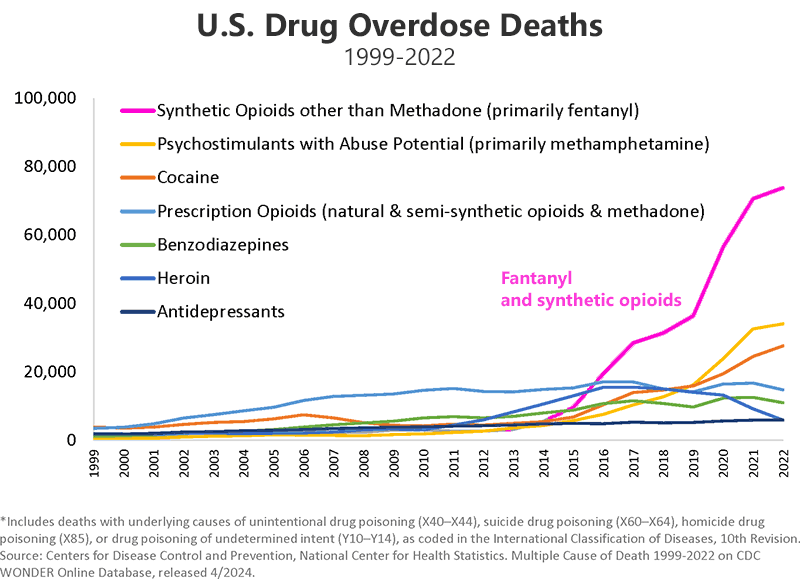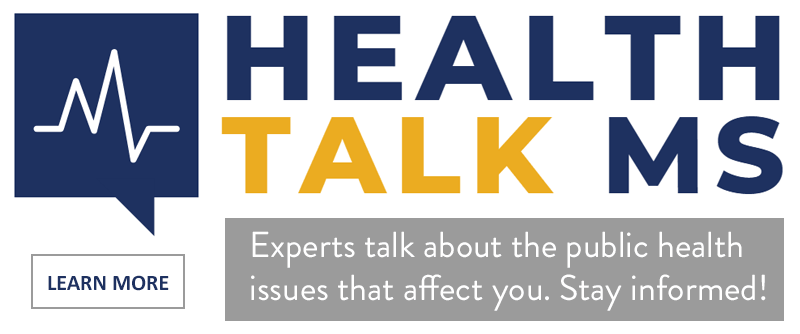The Mississippi State Department of Health's Opioid and Substance Use Disorder Program works to address the epidemic of drug misuse, and has led the way in drug categorization and accurate reporting of drug categories.
The MSDH Opioid and Substance Use Disorder Program has worked with state partners to:
- Establish a comprehensive drug abuse surveillance system.
- Expand access to naloxone.
- Provide training for healthcare professionals in opioid awareness, control and response.
- Expand access to outpatient opioid use disorder treatment.
- Improve public awareness and education on the scope of Mississippi's drug overdose epidemic.
Naloxone can reverse an overdose from opioids, including heroin, fentanyl and prescription opioid medications. Naloxone is also known as Narcan®, Kloxxado®, Zimhi® and RiVive®.
If you or someone you know is at an increased risk for opioid overdose, you should carry naloxone and keep it at home.
Naloxone is available over-the-counter or by requesting a prescription from your local pharmacist. The pharmacy will charge you retail price, or a co-pay if it is covered by your insurance.
Individuals can request a naloxone kit from the Mississippi State Department of Health and receive it by mail at no charge.
Organizations can also request naloxone in bulk for distribution.
Mississippi's Overdose Epidemic
The opioid overdose epidemic in Mississippi has occurred in distinct waves. The first wave started in the late 1990s as overdose deaths from prescription opioids increased dramatically. The second wave began in 2010 with overdose deaths related to heroin rising rapidly. The third wave started in 2013 with a sharp increase in overdose deaths involving synthetic opioids, particularly fentanyl. As each wave has leveled off, a new wave has started, resulting in a relatively stable overall opioid overdose death rate since 2006.

The increase of illicit fentanyl in Mississippi's drug supply and the rise in stimulant deaths present the latest challenges. Fentanyl and its analogs are many times more powerful than non-synthetic opioids, and carry a much higher overdose risk than heroin and other prescription opioids. These pills are difficult to distinguish from authentic prescription pills, creating a false sense of security among people using them, especially adolescents.
Multi-drug overdoses and overdose deaths are now on the rise as well. This challenge requires responsive action and flexible state planning to address substances beyond opioids alone.
The Mississippi Opioid and Heroin Data Collaborative

To understand the scope of this epidemic, the Mississippi Opioid and Heroin Data Collaborative has been tracking and reporting state-level opioid data since 2017. Current and previous partners in this effort include the Mississippi State Department of Health, the Mississippi Board of Pharmacy's Prescription Monitoring Program, the Mississippi Department of Mental Health, the Mississippi Bureau of Narcotics, Mississippi Emergency Medical Services, and The University of Southern Mississippi.
The Mississippi Prescription Monitoring Program
The Mississippi Prescription Monitoring Program is an electronic tracking program managed by the Mississippi Board of Pharmacy to help practitioners and medical dispensers identify possible inappropriate use of controlled drugs and other designated medications. The online service supplies a patient-controlled substance prescription history, and information about the prescriber and dispenser. This program supports the legitimate use of controlled substances while helping to safeguard public health and safety

